How Stress Impacts Blood Pressure and Heart Health

Understanding the Critical Link Between Stress and Heart Health
In today's fast-paced world, stress has become an almost unavoidable part of life. While it is often recognized for its mental and emotional effects, its profound impact on blood pressure and heart health is equally significant yet less understood. This article explores how stress induces physiological changes that affect cardiovascular function, highlights the risks associated with chronic stress, and discusses effective management strategies to protect heart health.
Physiological Mechanisms Linking Stress to Blood Pressure Changes
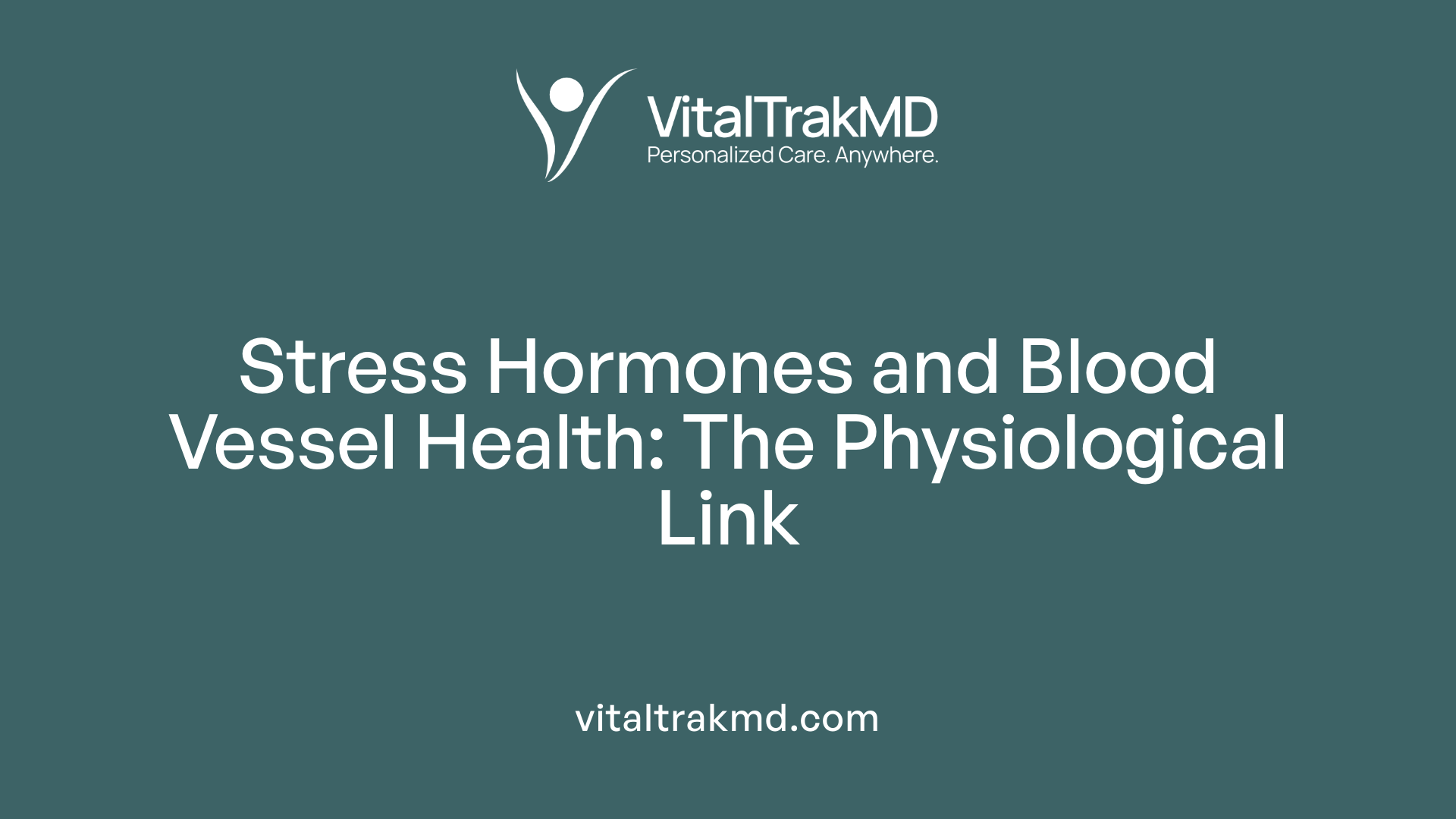
What are the physiological mechanisms linking stress to blood pressure changes?
Stress triggers a complex physiological response involving multiple body systems that aim to prepare the body for immediate action—a response often referred to as 'fight or flight.' Central to this process is the activation of the sympathetic nervous system. When stressed, this system responds within seconds, releasing hormones such as epinephrine (adrenaline) and norepinephrine. These hormones cause the heart to beat faster and blood vessels to constrict, which rapidly increases blood pressure.
In addition to adrenaline, the hypothalamic-pituitary-adrenal (HPA) axis is activated over minutes, releasing cortisol. This hormone increases energy availability but also contributes to elevated blood pressure by promoting vasoconstriction and affecting other risk factors such as blood sugar and cholesterol levels.
The combined effect of these stress hormones leads to vasoconstriction—narrowing of the blood vessels—and an increased heart rate, both of which elevate blood pressure temporarily. Adrenaline specifically raises the heart's oxygen demand and can cause spasms in coronary arteries, risking ischemia or temporary reductions in blood flow to the heart.
When stress is persistent, high levels of these hormones are sustained, leading to long-term increases in blood pressure—known as hypertension. Chronic activation damages blood vessels, promotes plaque buildup, and strains the heart, increasing the risk of cardiovascular disease. Managing these physiological responses is crucial for maintaining healthy blood pressure and overall heart health.
Impact of Acute and Chronic Stress on Blood Pressure and Heart Function
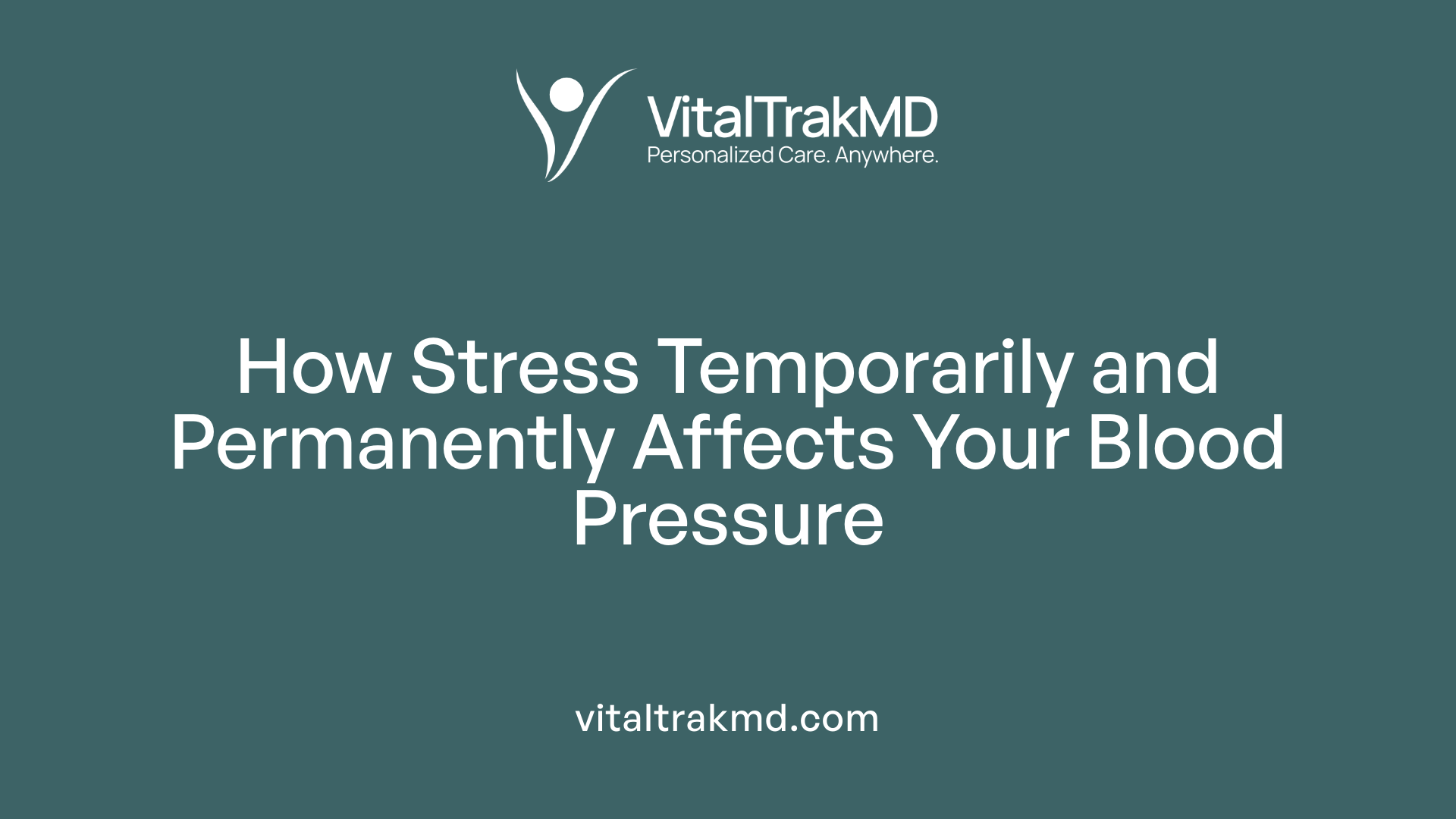
How much can stress raise blood pressure during acute episodes?
During acute stress, the body's fight-or-flight response triggers the release of hormones such as adrenaline and cortisol. These hormones cause the heart to beat faster and blood vessels to constrict, leading to an increase in blood pressure. Typically, this temporary spike can raise systolic and diastolic pressure by about 10-20 mmHg. This rapid response prepares the body for immediate action but generally subsides once the stressful situation passes.
However, repeated intense episodes or prolonged stress exposure can have more serious consequences. Over time, these recurring spikes may damage blood vessel walls and accelerate the development of chronic hypertension, significantly elevating the risk of cardiovascular disease.
Can long-term stress and anxiety cause sustained high blood pressure?
Long-term stress and anxiety don't directly cause hypertension in everyone, but they often contribute to its development. Chronic stress keeps the body in a heightened state, involving continuous hormone release, notably cortisol. Elevated cortisol levels increase blood pressure, blood sugar, and cholesterol, all factors linked to cardiovascular disease.
Additionally, ongoing stress influences unhealthy coping behaviors such as poor diet, inactivity, smoking, and excessive alcohol use. These lifestyle factors can promote plaque accumulation in arteries and hypertension.
Research indicates that persistent physiological responses to long-term stress—like vascular constriction, delayed blood pressure recovery, and inflammation—may cause sustained increases in blood pressure. Over time, this systemic strain can cause damaging effects on blood vessels and the heart, making chronic stress a significant contributor to the development of hypertension and related cardiac issues.
More Information
For further insights, search terms such as "long-term effects of stress on blood pressure" can yield detailed studies exploring the pathways through which sustained stress influences cardiovascular health. These investigations highlight the importance of managing stress effectively to prevent its long-term impacts on blood pressure and overall heart health.
Stress and Mental Health: Emotional Factors and Cardiovascular Risks
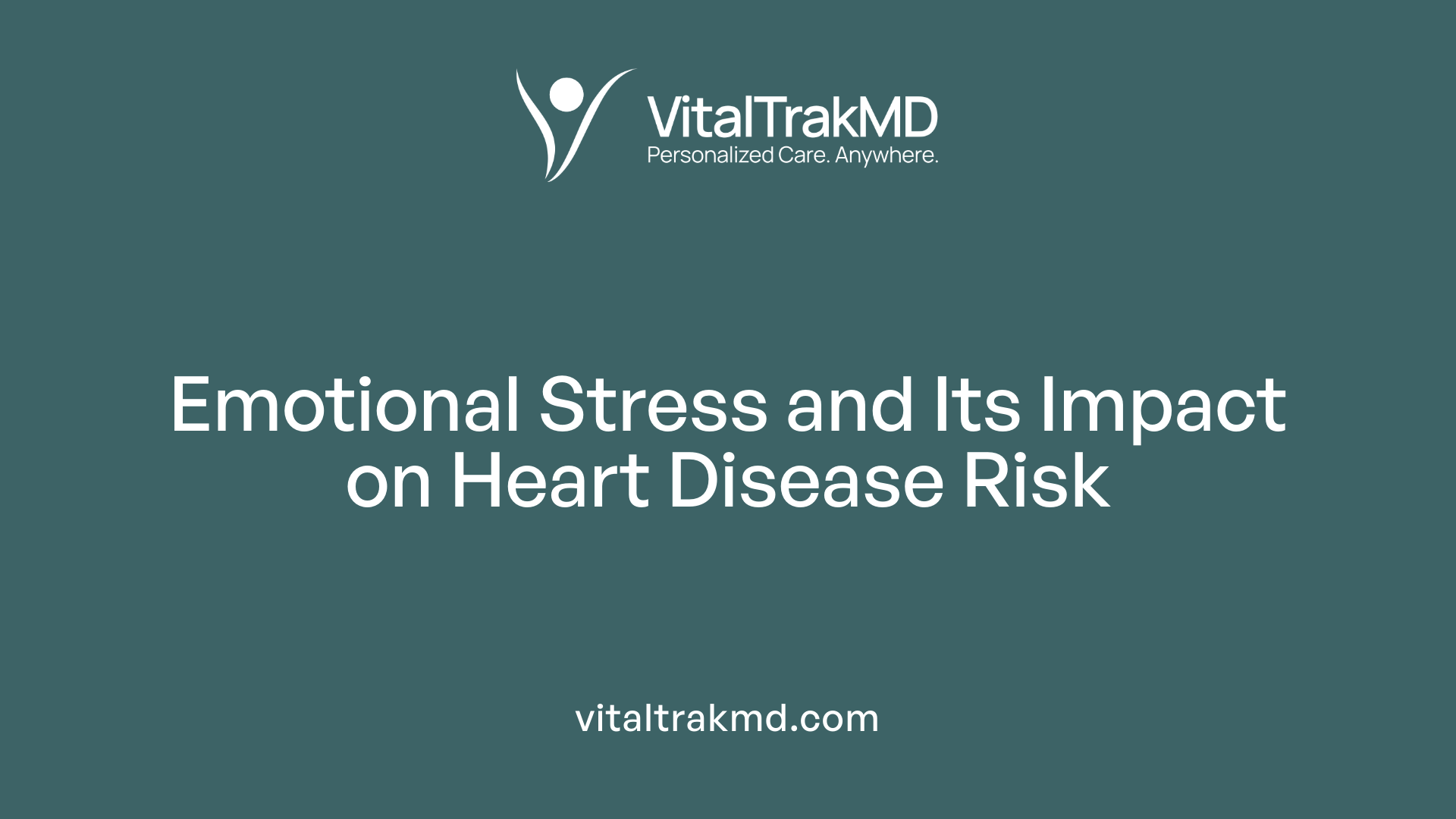
How does stress affect blood pressure and heart health?
Stress influences heart health primarily through the body's hormonal responses. When faced with stress, the sympathetic nervous system triggers the release of adrenaline and cortisol. These hormones cause the heart to beat faster and constrict blood vessels, temporarily raising blood pressure.
Long-term or chronic stress keeps these physiological responses active over extended periods. This persistent activation leads to sustained high blood pressure, which can damage blood vessel walls and accelerate plaque buildup—a process called atherosclerosis. Furthermore, elevated cortisol levels are associated with increased inflammation, insulin resistance, and abnormal blood lipid levels. Together, these effects increase the risk for heart attack, stroke, and other cardiovascular diseases.
Research suggests that mental stress can trigger phenomena such as mental stress ischemia, where emotional stress reduces blood flow to the heart muscle, especially in individuals with existing heart conditions. This can lead to chest pain, irregular heart rhythms, and an increased likelihood of heart attack.
Certain populations, including women and minority groups, may be more vulnerable. Hormonal fluctuations and socio-economic factors such as discrimination and economic hardship heighten their risk of stress-related cardiovascular issues. Managing stress through healthy habits like exercise, social engagement, relaxation techniques, and medical support can help mitigate these risks and promote heart health.
Behavioral and Indirect Effects of Stress on Heart Risks
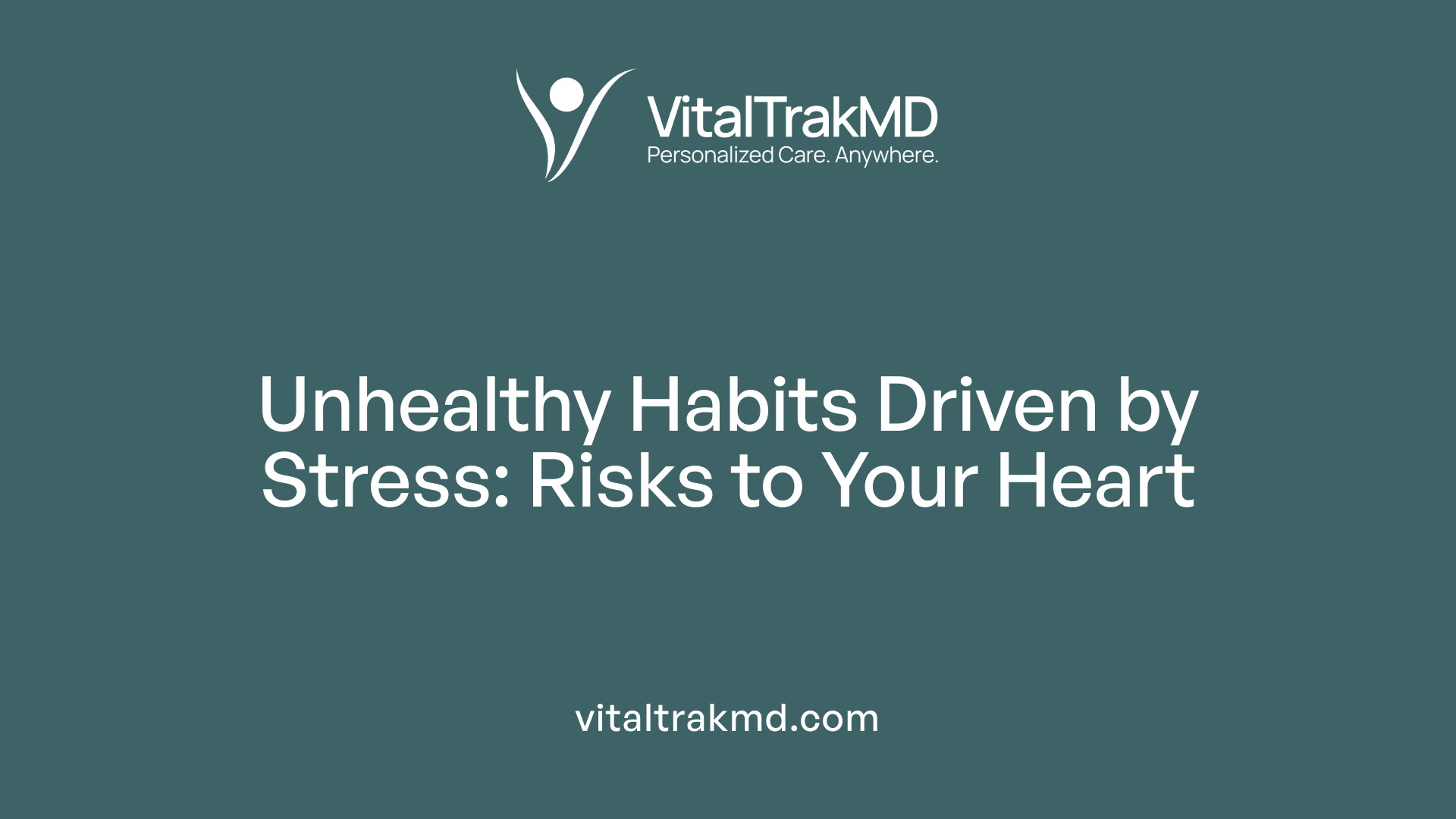
Unhealthy coping behaviors
When faced with ongoing stress, many people adopt unhealthy habits as a way to cope. These behaviors include smoking, overeating high-fat or sugary foods, excessive alcohol consumption, and physical inactivity. Such habits can significantly damage heart health by raising blood pressure, increasing cholesterol levels, promoting obesity, and fostering inflammation. Over time, these effects enhance the risk of developing heart disease and other cardiovascular problems.
Poor diet, smoking, and alcohol use
Stress often leads to poor dietary choices, such as consuming comfort foods high in salt and sugar, which can contribute to hypertension and obesity. Smoking is another common response to stress, offering temporary relief but increasing the risk of artery damage and clot formation. Similarly, alcohol overuse can elevate blood pressure and triglycerides, impair liver function, and lead to dependency, all of which are detrimental to cardiovascular health.
Impact of social environment and discrimination
Your social environment and experiences of discrimination also influence stress levels and heart health. Chronic exposure to social isolation, negative relationships, or racial discrimination can trigger persistent stress responses. These stressors increase cardiovascular reactivity, promote inflammation, and impair blood vessel function, raising the likelihood of hypertension and heart disease. Particularly in minority populations, systemic discrimination can cause heightened stress and related health disparities.
Influence of socioeconomic status
Socioeconomic status (SES) plays a crucial role in stress-related health risks. Individuals with low SES often face higher stress levels due to financial hardship, job insecurity, and limited access to healthcare resources. These stressors contribute to unhealthy lifestyle choices and delay in seeking medical care. As a result, they experience higher rates of hypertension, obesity, and heart disease.
Why is understanding stress-related health risks important for prevention and treatment?
Understanding how stress influences health is fundamental for developing effective prevention and treatment strategies. Chronic stress fosters behaviors and physiological responses that increase vulnerability to heart problems, including high blood pressure, inflammation, and plaque buildup. Recognizing individual stress triggers and their physiological impacts allows healthcare providers to recommend personalized interventions, such as stress management techniques, lifestyle modifications, and social support systems. These measures can help reduce health risks, improve resilience, and promote long-term heart health.
| Factor | Impact on Heart Risks | Contributing Factors |
|---|---|---|
| Unhealthy coping behaviors | Increased blood pressure, cholesterol, obesity, inflammation | Smoking, overeating, alcohol, inactivity |
| Social environment | Elevated stress response, inflammation, blood vessel damage | Discrimination, social isolation |
| Socioeconomic status | Higher stress levels, unhealthy habits, delayed healthcare access | Poverty, job insecurity, limited resources |
| Physiological responses | Elevated catecholamines and cortisol, vascular constriction | Chronic stress, emotional distress |
In summary, stress impacts the heart not just directly through physiological reactions but also indirectly by influencing lifestyle habits and social circumstances. Addressing these factors holistically is key to reducing cardiovascular risks and improving overall health.
Strategies for Managing and Mitigating Stress Impact on Heart Health
What are effective management strategies to reduce stress's impact on heart health?
Managing stress is essential for protecting your heart and overall health. Several approaches have proven effective.
First, engaging in regular physical activity, such as walking, cycling, or swimming, can lower blood pressure, reduce inflammation, and improve mood. Exercise helps modulate the body's stress response and supports heart health.
Relaxation techniques are also valuable. Practices like meditation, deep breathing exercises, biofeedback, or listening to soothing music activate the body's relaxation response. These methods help decrease cortisol and other stress hormones that can harm the cardiovascular system over time.
Maintaining social connections and engaging in hobbies contributes to mental well-being. Adequate sleep and positive emotional experiences help regulate blood pressure and reduce inflammation.
Developing skills to identify stress triggers, such as tight deadlines or conflicts, enables better management. Avoiding harmful behaviors like smoking, excessive caffeine intake, or overeating also supports heart health.
In some cases, medical or psychological interventions, including counseling or medication, might be necessary, especially for managing anxiety, depression, or chronic stress.
Ultimately, lifestyle changes and behavioral habits are the foundation of effective stress management. Combining physical activity, relaxation, social support, and healthy routines can significantly reduce the adverse effects of stress on your heart.
The Importance of Early Detection and Routine Screening
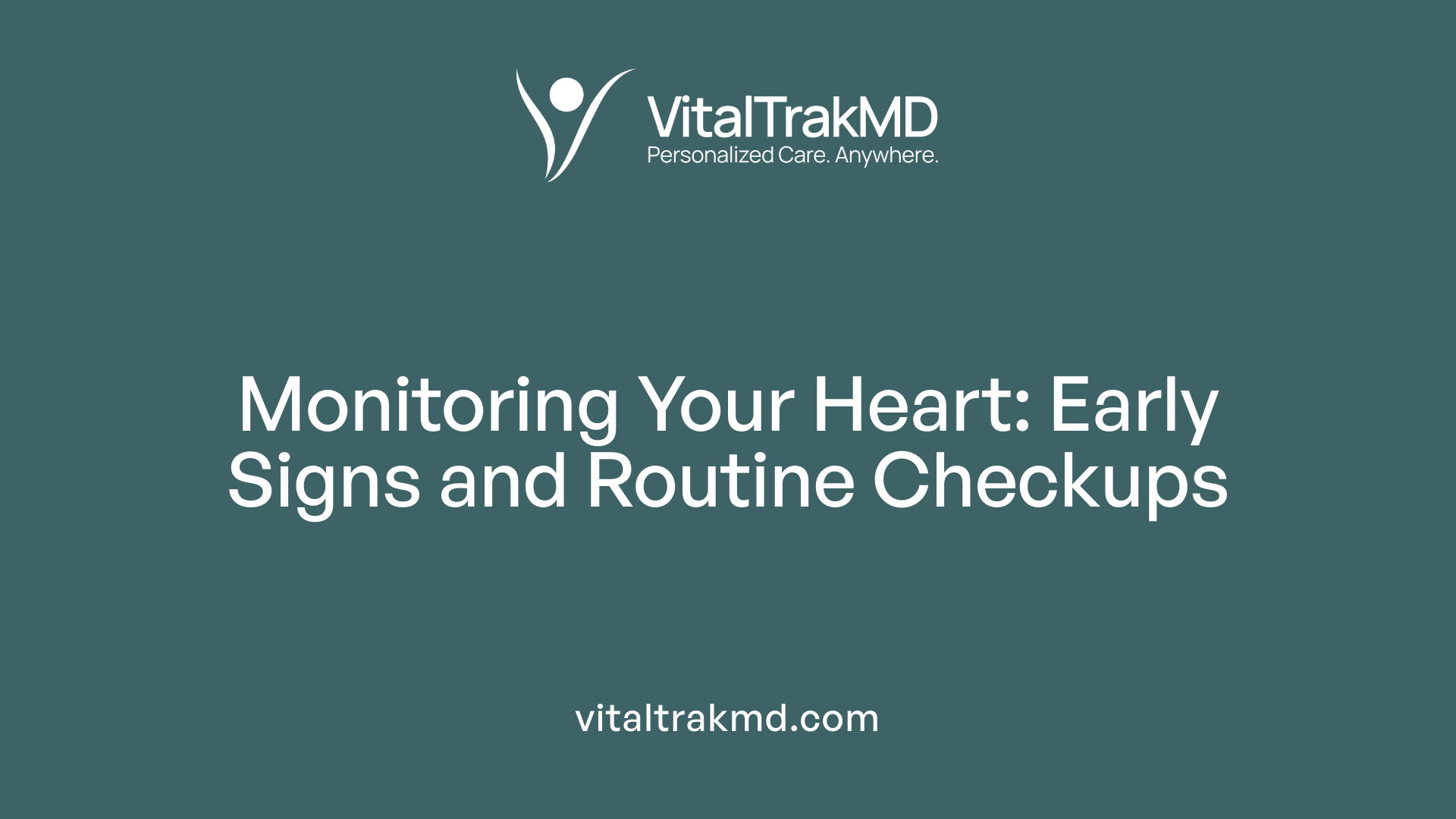
What are the signs that stress is affecting your heart?
Signs that stress may be impacting your heart include physical symptoms such as chest pain, irregular heartbeat, shortness of breath, fatigue, muscle tension, headaches, and sleep disturbances. Chronic stress can lead to increased inflammation and elevated stress hormones like cortisol and adrenaline, which can cause blood vessels to constrict or spasm. This may result in stress cardiomyopathy, often called 'broken heart syndrome.'
Unhealthy behaviors linked to stress, such as smoking, overeating, or alcohol overuse, further contribute to cardiovascular risks. Recognizing these early signs is crucial, as they can precede more serious conditions like heart attacks or stroke. Regular health check-ups that monitor blood pressure and identify patterns related to stress response are vital for early intervention.
Maintaining a routine of blood pressure and cholesterol testing helps detect stress-related changes before they develop into chronic health problems. Implementing lifestyle modifications, managing emotional responses, and seeking medical advice when symptoms arise can significantly reduce the risk of adverse heart events.
Blood pressure monitoring and its role
Regular blood pressure measurements, both in clinical settings and at home, are critical, especially for those experiencing high stress levels. Elevated blood pressure responses during stressful events, if persistent, may indicate developing hypertension.
Cholesterol checks
Cholesterol screening is essential because stress-related behaviors like poor diet can raise harmful LDL cholesterol levels, contributing to plaque buildup in arteries. Early detection allows for dietary and lifestyle adjustments to mitigate the risk.
Identifying stress-induced blood pressure patterns
Monitoring for patterns such as white coat hypertension or masked hypertension can reveal how stress influences blood pressure readings in different settings. Continuous or ambulatory monitoring provides insights into blood pressure variability linked to daily stressors.
Preventive care for high-risk groups
High-risk populations—including those with a family history of hypertension, heart disease, or experiencing high socioeconomic or racial stress—should undergo regular screening. Tailored interventions, stress management techniques, and lifestyle counseling can help manage risks effectively.
| Screening Type | Purpose | Detects | Additionalnotes |
|---|---|---|---|
| Blood pressure monitoring | Tracks BP fluctuations due to stress | Hypertension, prehypertension | Use both clinical and home devices |
| Cholesterol checks | Assesses lipid levels induced by stress | High LDL, triglycerides | Important for dietary planning |
| Blood behavioral and pattern tracking | Identifies reactive BP patterns | Masked or white coat hypertension | Employ ambulatory monitors |
| Risk factor assessment | Guides preventive strategies | Overall cardiovascular risk | Includes psychological and social factors |
Incorporating routine screenings and understanding stress-related responses enables early intervention to prevent long-term cardiovascular damage. Maintaining awareness and managing stress through healthy habits are essential steps toward heart health.
A Holistic Approach to Heart Health and Stress Management
Managing stress is integral to maintaining optimal blood pressure and preventing cardiovascular disease. Combining lifestyle modifications, relaxation techniques, social support, and medical care can significantly diminish the physiological and behavioral impacts of stress. Early detection through routine screening and personalized interventions empowers individuals to reduce their risk factors and promote long-term heart health. Recognizing the complex interplay between stress and the cardiovascular system underscores the importance of a comprehensive, proactive approach to health, fostering resilience and improving quality of life.
References
- Managing Stress to Control High Blood Pressure
- Stress and hypertension - PubMed
- Under pressure: How stress may affect your heart - Harvard Health
- Yes, Stress Can Hurt Your Heart: 3 Things to Know - Yale Medicine
- Chronic Psychosocial Stress and Hypertension - PMC
- How Stress Affects Your Heart | SBM - Society of Behavioral Medicine
- Stress Can Increase Your Risk for Heart Disease - UR Medicine
Recent articles
Want to Feel Better and Live Healthier?
Join hundreds of patients taking control of their health with personalized care that fits their life – not the other way around.
Rated 4.8/5 by 32+ customers







